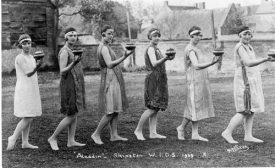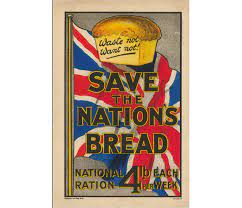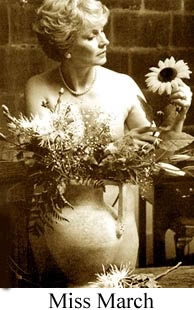Recently, I watched a BBC2 programme about medieval London and its sanitation problems. Dan Snow's vivid and interactive account - there was a small scratch-card, supplied by the Radio Times, which I sniffed at the right moment - told me much I already knew but it was overwhelming seeing and smelling it all at once. By the 14th century, London was a city of over 100,000, a teeming, dark, filthy smelling and sewerage-filled place. I was fascinated by the platform shoes medieval Londoners wore to try to wade through the sloppy streets and also by the work of the gong farmers - cleaners armed with rakes and shovels, working at night, trying to clean the streets.
This was a gruesome account at times, especially when Dan spoke of the medieval butchers and tanners, and then the horrors of the Black Death, which raged in London for two years (1348-50) but I shall be watching again, when the series recreates the stench of pre-revolution Paris.
For my medieval romances, I do not dwell on the stink of London (not very romantic!) but I do mention it, and the filth of the streets, in my novella, "Mistress Angel."
My sweet to sensual Medieval Historical Romance "Mistress Angel" can be read for free with Kindle Unlimited and found at these places:
Amazon Com
http://www.amazon.com/Mistress-Angel-Lindsay-Townsend-ebook/dp/B019AT3NAA/
Amazon Co UK
http://www.amazon.co.uk/Mistress-Angel-Lindsay-Townsend-ebook/dp/B019AT3NAA/
You can read an excerpt below
Historical Note.
The scene where Isabella is inside a golden cage suspended over the cobbled streets of London is based on a real event. In May 1357 Prince Edward, whom we now call The Black Prince, escorted the captured king of France through London in a glittering victory procession. Londoners flocked to see this and the London guilds vied with each other to add to the spectacle. The London goldsmiths placed twelve maidens in golden cages above the route where the princes would pass. In my novella, I make Isabella one of the maidens.
Child betrothals and child brides were a part of the Middle Ages. One of the most famous is Margaret Beaufort, who was married at just twelve and who became pregnant just before her thirteenth birthday. After a long and difficult labor she gave birth to a son who as Henry Tudor would become King of England and Wales. Even at the time the early consummation of her marriage was remarked on with some censure. Margaret later was keen to ensure that her granddaughter was not sent to her betrothed the king of Scotland too young in case the king consummated the marriage at once and so injured her.
Excerpt
Chapter 1
London, May 1357
Isabella was reading a scolding letter from her mother when Sir William's man-servant John stepped into the workshop and jerked his head to the outside, holding the door open for her.
She tucked the scrap of parchment into her belt and hurried into the back yard, lifting her skirts clear of the cloying mud. It was raining still, a light spring drizzle that had lasted for days and stirred up the usual offal and dung stink of London. She wrinkled her nose and covered her mouth with her hand.
“Hurry!” John urged. “The master does not like to be kept waiting.”
Isabella picked her way round a deep cart track and made for the stand of cherry and apple trees against the back boundary wall of her husband's family house. The tall, portly figure waiting beneath these trees was unmistakable, as was his goldsmith's livery, worn by most guild members only on festivals and holy days but as a regular costume by him. She bowed her head.
Sir William waved his servant away. “You are too brown,” he grumbled as Isabella approached. “Are you a washer-wench, to be so brown? That will not do.”
Naturally I am tanned, through outdoor work. She had been instructed by her husband's family to weed the garden plot and gather greens daily, all work beneath her, but Isabella knew better than to protest.
“My son?” she asked quickly.
Sir William dismissed her anxious question with a sharp shake of his head. “Later,” he snapped. “When you prove your worth to us.”
Isabella fixed her eyes on the golden tips of Sir William's gilt-edged shoes and strove to appear calm. She had been hearing variations of this and other complaints for years, and they held no sting for her. The absence of her son was altogether different. When may I see my child? It has been months since Richard took him from me and his family still keep us apart. Had I the means I would go to law, for in this household no one listens to me. How does my son fare? Does Matthew think of me? She longed to ask all of these things.
“How long have you been with us, Isabella?”
“For six years, since I wed your nephew.”
She had been married to Richard at twelve, made pregnant two years later and widowed three years after that, following a long and bitter apprenticeship of wedlock. I have been a widow for six months and I do not miss a moment of my marriage.
She sensed Sir William staring at her, stroking first his squirrel-fur cloak, then his neatly-trimmed beard. She resisted the impulse to shudder.
“You are much improved in looks of late,” he remarked.
Yes, not being beaten nightly by a drunken brute improves a woman's appearance. Isabella raised her head. “May I see Matthew?”
Sir William frowned at the second mention of her son. “Did I not say later? Have you a better gown?”
Accustomed to his abrupt manner, Isabella said nothing. Sir William need only check the household accounts to realize she had three dresses. One was her bridal gown, a tiny, wrinkled dress, worn with such hopes when she was still only a child. She could scarcely bear to look at it now.
“We must have you robed in brighter colors,” Sir William continued. “And you must stay indoors. Wash your face in whatever women use to whiten skin. You must shine like a jewel.”
When she was first married, Isabella had been full of questions, until Richard's ready fists had silenced her. She nodded to show she understood and waited to be told more. Perhaps I am to be married again, she thought, and hoped this time the man would be kind. Please let him bring my son Matthew back from wherever he is living and safe into our home. If my new husband does that, I will love him forever.
Sir William picked a spray of cherry blossom and held it alongside her face. “Yes, you shall do very well,” he rumbled. “Your dowry is gone, you failed in your marriage task, you have no great skills, but we can put that beauty of yours to work.”
Abruptly, he seized the front of her bodice and yanked on the loose cloth, half-exposing her breasts. Isabella covered herself with an arm but did not resist or utter a sound. If feigning acquiescence brought her news of her son she would be as still and silent as a grave.
“Good, good.” Sir William strolled around her, pinching her flanks, muttering, “She needs a touch more flesh here, but her breasts are still ripe, for all her nursing of that pup.”
Surely he would tell me if Matthew is dead? She had not set eyes on her son for seven months, since Richard had spitefully sent him off to another household, somewhere in Kent. My husband did that just before he was killed, murdered in a blood-feud not of my making but for which I am still blamed. When will it end?
“You will oblige me,” Sir William went on, and he took her roughly by her shoulder and half-turned her, back to the house. “There, look at your son now. Not one word.”
Isabella blinked the drizzle from her eyes and stared at the small, thin figure standing with his back to her in the open doorway to the workshop.
It was Matthew, clothed in the belted blue cloak and cap she had made for him last winter, his fair, curling hair a little longer and more sun-bleached than when she had last seen him. He was growing and carried himself very straight, she thought proudly. She took a step forward, closer to him. He was no more than a baby when Richard ripped him from me. Now he is a little boy of four years old, just four.
“No nearer,” warned Sir William. “That is enough.”
He gestured to someone at the house and the door closed, cutting Isabella off from that too-brief glimpse. Heart-scalded, she swung round. “Please, let me speak to Matthew,” she begged. Let me hold him, embrace him, smell him, hug him. Relief that he was alive washed through her, making her weak when she had to be strong.
“To business,” Sir William remarked dryly, watching her fumbling with her gown strings, his eyes bright, with the pitiless interest of a bird. “You have seen the boy, now heed my terms.”
Isabella chewed on the inside of her cheek to stop a rising cry, glad that the rain hid her tears. She nodded in silence, bracing herself.
Even now, Matthew must not know I am here. Surely if he did he would come to me? And will I see him again? How long will he stay?
Sir William smiled. “You will do much, make great efforts to see your son again?” He did not wait for an answer. “This family needs to make good alliances, and you are available. Stephen Fletcher I thought. He is armourer to Duke Henry himself, and widowed.”
His smile widened and his hard dark eyes sparkled with open malice. “I understand he is like you, the offspring of a commoner. Some would call him a blacksmith. You should do well with him.”
Isabella felt her face flush with anger. “And how, pray, will I meet him?”
“Use what wit you have, girl, and find out!” He pinched her cheek, hard, and moved away, tossing her final orders as he strolled off. “I shall expect strong progress in your suit, Isabella. Win him within the month, become his mistress, extract rich gifts and favors from him, or you shall not see your son again. I will adopt Matthew as my own.”
He went inside, out of the rain, and slammed the door in her face.
****
Isabella ran after him, but Matthew was already gone. Her heart aching inside her chest and desperate to escape the ready complaints of her mother-in-law, she claimed that Sir William asked her to collect a parcel of herbs from the apothecary's. Outside again in the rain, she stumbled by way of the back lanes to the house and shop of her friend, Amice the Spicer.
Amice took one look at her and drew Isabella behind the curtain at the back of her shop, where she had a bed she slept in when guarding a fresh batch of cinnamon from burglars.
“Get under the covers and warm up,” she said, in her brisk, managing way. “As you see, the shop is quiet now, so we can talk. Have you received another letter from that prating mother of yours, blaming you for a feud not of your making? I presume your own flesh-and-blood have not welcomed you back?”
“No, they have not.” Isabella shook as she stumbled into the bed. I do not think they will ever do so. Like Amice she knew that, according to custom, she might have returned to her own family, now that Richard was dead. Her parents however had cast her off. Her mother still wrote letters, but only to instruct her and to complain. To my parents I am one of the Martintons now. It was a terrifying thought, one she dared not dwell on.
“Is your mother-in-law expecting you to spin gold from straw or some other foolishness?”
Amice’s ironic question returned her to the present. A present even harder than my past. “I saw Matthew,” Isabella burst out through chattering lips. “They would not let me speak to him. He did not even know I was behind him.”
“Ah, that old cruelty.”
The sympathy in Amice’s warm voice brought Isabella to tears. She shuddered violently as her friend swept the warm, coarse blankets up to her ears.
“Rest first, then tell me everything.” Amice bustled out into the shop again, closed the shutters and returned to light a brazier. “What did you say to get out of that wretched den?”
“That my uncle needs herbs.”
“I have those. I shall give you a bundle when you leave.”
Isabella closed her eyes for a moment, willing herself not to cry. Away from her reluctant family-by-wedlock and the thunderstorm tension of the household, she felt her constant headache begin to clear. It was marvelous, too, to be safe at Amice's, snug and warm in a low-gabled shop perfumed with spices. She sighed, sitting up with a pillow behind her head as her friend brought her a cup of warmed wine. “Thank you.”
“None needed.” Amice batted aside her gratitude. “We both know what you did for me. It is my pleasure to help you in return, in any way I can.”
Isabella knew she meant it. They shared the cup between them, Amice telling of a Flemish merchant in the shop that morning, seeking pepper and saffron. Her black, strong-featured, full-lipped face was animated as she mimicked the accent of the Fleming, kicking her long legs against the wall as she reached the climax of her tale.
“Paid me a good fistful of gold and unclipped coins for a few threads of saffron and one of my kisses. The man seemed to think I was an Ethiope out of Egypt and said my mouth was a lucky charm. I kissed him once, on the cheek, and did not tell him I come from the back end of Cheapside.”
She chortled, finished the wine and put her dark, handsome head to one side. “You smell calm again,” she announced. Amice was a believer in the scent of things. “Will you have more wine? I have peppermint to disguise your breath from your mother-in-law.”
Isabella smiled and shook her head. Reaching inside her gown, beneath the drawstrings Sir William had so roughly parted, she found the three gold rings strung on a cord and handed the rings and ribbon to Amice.
“Sell or pawn?” Amice asked.
“Sell,” Isabella said firmly. These rings were the last of her dowry, hidden away by her and forgotten by Sir William, Richard's mother and her parents. “I need a good price.”
Swiftly she explained why. “I have only weeks to secure this Stephen Fletcher, and through him my son,” she concluded.
“A harsh undertaking,” Amice remarked. “They are unkind people, your husband’s kin.”
Isabella could not disagree but, thinking of the seemingly impossible task, she began to feel a coil of hope.
“The goldsmiths' guild is planning a great spectacle when Prince Edward brings the French king back with him to London. I need to bribe my way into it.”
“A good place to see and be seen, for sure. And Sir William swore you would have new gowns for this?” Amice held a ring set with a huge square sapphire close to the twisting flames of the brazier and gave a small grunt of satisfaction. “This is fine.”
“Sir William promises many things, but I find they do not happen.”
Amice's keen eyes glittered. “Then you are blamed.”
Isabella shrugged. “I cannot afford to wait to see if he grants me fresh gowns. I have my son to consider.” Matthew! How I wish I could have talked to you today, held you, kept you by me.
“I will go today, before curfew.” Amice rattled the rings in her palm. “Is any of this work Richard's? Let me avoid questions, if I can.”
“Have no fear on that score. I have and hold nothing of his.” Which is why his kindred keep Matthew, as the only hold they have over me.
She flinched as Amice brushed her wrist. “I will bring the money tomorrow,” her friend said.
“Thank you,” Isabella murmured, wishing she could stay where she was until Amice returned. Knowing she must leave before she was missed in the workshop, she flung back the covers and scrambled to her feet. “I do not know where I will be tomorrow. Sometimes my mother-in-law keeps me at home.”
“I will find you.”
****
The following day it was raining harder and foggy, a thick gray miasma coating the city roofs and towers. Isabella fretted about Amice having to visit her in this dismal murk, but her mother-in-law found an excuse to dispatch her into it.
“I have a fancy for oysters and malmsey,” Margery instructed, counting a few pennies into Isabella's hand. “You must go, girl, I can spare no other. Take the spit-boy with you as guide, though you do not really need one, do you? Not with your parents living so close by the docks.”
“Honored mother.” Knowing Margery would be irritated by that form of address, Isabella followed it up with a bow and stalked out into the pouring rain. She and the spit-boy scowled at each other until the end of the street, marched around a corner, shook hands and parted ways. Nigel was her ally, although both knew he was meant to spy on her for the family. Now they were free for an hour or so and Isabella intended to make full use of the time.
She called on Amice first, but her friend was also out and Amice’s limping apprentice had no idea where she could be found. Resigned to seeing Amice as God willed it, Isabella drew her molting fur cloak tightly about her shoulders and trod nimbly beneath the dripping jetties.
She loved being out in the city, part of its vivid heart. She was always excited to be in London, even in the dreadful year of pestilence when Richard had taken Matthew and, with his kin, fled the city for their holding in East Ham. She and the prentices had been left in the workshop and it had been hard. When she did not dread the boils and bloody coughing she feared fire, or looters, but they had all come through—London had not failed her, even then. Now, slipping and sliding through the muddy alleys, avoiding shadowed corners, flicking a small coin to a beggar camped beneath a jetty, she heard a hundred different voices in the fog and a dozen different tongues and knew she was home.
Matthew should be with me, learning these streets.
She did not make for the docks. Oyster and wine sellers thronged the city, so she wasted no effort on the wharves where wine barrels were unloaded. She had no desire to encounter her father, although he had lately grown so rich as a vintner that he might not trouble to be out on such a day.
Reflected in the pallid fog, a moving, closing shadow shimmered against the wattle wall of the house opposite. Frustrated by her small, female state, Isabella hunched into a doorway and waited until the creeping footpad vanished along another narrow lane. Amice stalked these alleys like a warrior but Amice was tall and knew how to fight with a knife. Shorter by half a head and allowed no decent blades, Isabella was constantly reminded of how easily she could be mauled. Had Richard not proved that, night after night?
Hearing the bells of great Saint Paul's thundering above her, watching the hop-and-skip of folk darting in and out of the rain, she waited until she could make out the raucous calls of the street sellers again. Moving on, she turned off the house-step—straight into the path of a man leading a bay horse and eating a pie.
“Hold there!”
The stranger tossed his pie to a shivering urchin and caught Isabella as she slithered back, his grip firm but not cruel. “If you would be a cut-purse, girl, you need to be quieter.” He stared down at her while his horse chewed on a slither of hanging roof-thatch and a water-seller shouldered past them both, muttering curses.
“Forgive me, sir.” Isabella did not recognize the man but she was keen to be on her way. He was taller than Amice and almost as dark, with a tanned, clean-shaven face and penetrating eyes. Green-gray eyes, she realized with a jolt, as he plucked her off the step and up onto the saddle of his mount with the same ease as she might lift a toddler.
“Unhand me!”
“Where are you going?” he asked, ignoring her protest. She began to slide off the back of the glossy bay but he anticipated that move and stopped her simply by catching her foot.
“Sir!”
“This is neither the weather nor the place for a decent maid,” he went on, his green-gray eyes sparkling with amusement as she glowered at him. “Let me take you where you need to be.”
Isabella knew she looked like a servant. “Why would you do that?”
He grinned and released her foot. “Even beggars deserve kindness now and then. Besides, you did not get those good teeth and fine accents on any midden heap. Now, where should I carry you away to?”
They were moving, Isabella realized, the horse piling through a vast puddle with the man splashing carelessly alongside. Another moment and they would be within sight of the grand houses and palaces of the river, and, to the north, the goldsmiths' new guildhall, still being built.
It would not do for him to escort her there with so many wagging tongues eager to take the news to Sir William. If need be, I shall tell my own gossip and, please God, be rewarded for it with a visit to or from my son.
“Here,” she called, pointing to a small glover's shop tucked around the corner of a crooked alley. “This is my place.”
The stranger reined in at once. Before Isabella could stir he swept her off his horse and lightly onto the cobbles, nodding to the wide-eyed glover. “I will see you safe within.”
“There is no need.” Conscious of his height and breadth and easy strength, Isabella felt heat tiding into her face. She prayed she was not blushing. “Thank you for your help, Sir…?”
He smiled, his eyes still bright with amusement, and answered readily, “Stephen Fletcher, at your service, Mistress Angel.”
Isabella automatically gasped. The very man I have to win! All calculation deserted her as they stared at each other. What will it be like to be in Stephen’s arms? What will his kisses be like?
Heedless of the prickling rain, Stephen studied her for a long moment, his eyes narrowing as if he guessed her thoughts. Isabella forced herself to bow her head, her breath threatening to stop as she waited, crucified by his silence. What now? Should I say more, do more?
She felt a gentle touch, softer than rain, brush against her cheek.
“I pass this way tomorrow,” he said softly. “I need new gloves.”
“I shall be here.” Why did I say that? ‘Tis madness to promise anything!
“Until tomorrow, Mistress Angel.” Stroking another raindrop from her flushed face and raising a hand in farewell, Stephen mounted his bay and cantered off in the direction of the river.
















